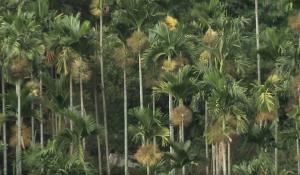Betel nut has been a lucrative cash crop for the past two decades, second only to rice. However, there are negative impacts on the cultivation of betel nut, such as an increased incidence of landslides and the contamination of land and rivers by pesticides. The International Agency for Research on Cancer (IARC) declared betel nut as a Class I human carcinogen in 2003, making the production of betel nut harmful to the health of the nation.
In recent years, the Agriculture and Food Agency has implemented the "Betelnut Abandonment and Conversion Program" to reduce the area of betel nut cultivation in line with the central government's policy. As long as farmers change their crop from betel nut to the designated crops, they can apply for a conversion subsidy. It is hoped that the program will improve people’s health and the environment of Taiwan’s mountainous regions. There are still about 40,000 hectares of betel nut cultivation in Taiwan, so there is still a long way to alleviate the adverse effects of betel nut. To reform the public's bad habit of chewing betel nut and consequently improving the environment, we must start at the source. Reducing the cultivation and production of betel nut trees will help protect our forests and our health.
以下為中文對照
檳榔廢園轉作 農業經濟和睦發展
檳榔過去二十年都是高經濟作物,種植面積僅次於稻米。但種植檳榔存在山林水土保持、農藥汙染等負面影響。國際癌症研究總署在2003年更是宣布檳榔為第一級人類致癌物,生產檳榔有害國人健康。
近年來農委會農糧署配合中央政策,以縮減檳榔種植面積為目標,推行「檳榔廢園及轉作計劃」。只要農民轉種指定推薦農作物,即可獲得補助,期望透過計劃能改善國人的健康和山林環境。全台種植檳榔的面積現今仍有約四萬公頃,面對檳榔帶來的不良影響,還有漫漫長路需要努力。要改善大眾吃檳榔習慣以及水土環境,必然需要從源頭著手,減少檳榔樹的種植和生產,共同守護你我的山林。














































PeoPo 討論區
回應文章建議規則: